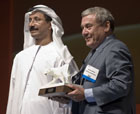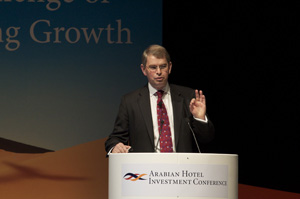GCC resilient in global downturn
 Speakers at the fifth Arabian Hotel Investment Conference laid out a bleak picture of the crisis facing the global hospitality sector for 2009, but stressed that recovery was expected within two years and the current situation opened opportunities for the long-term future.
Speakers at the fifth Arabian Hotel Investment Conference laid out a bleak picture of the crisis facing the global hospitality sector for 2009, but stressed that recovery was expected within two years and the current situation opened opportunities for the long-term future.
While development in the hospitality sector is predicted to slow to two percent in the Middle East, according to UNWTO figures, following several years of double digit growth, the region is still expected to be the top performer worldwide in 2008/09, according to Marvin Rust, Global Managing Partner Hospitality for Deloitte.
(Above: HE Sultan bin Sulayem , Chairman of Dubai World, receiving the AHIC Leadership Award from Sol Kerzner, chairman of Kerzner International)
“Average revPAR in the Middle East at US$148 is well above Europe in second place, and Dubai still leads the city revPAR table, topping New York, even though it was the first major city worldwide to turn negative from June last year - with a $36 drop from its peak,” he said.
Within the region, Rust said cities that were so far least affected by the current slowdown were Makkah, Jeddah and Beirut, the latter enjoying a 156 percent increase in revPAR during the first quarter of 2009 as political stability returns to the Lebanon.
“Those destinations showing the first signs of stress were Doha, Riyadh and Abu Dhabi - while the latter experienced a revPAR rise of 20 percent last year, the addition of around 16,00 rooms expected in 2009 and 6,000 more in 2010 will affect supply/demand.”
ADVERTISEMENT
Elsewhere in the region, Amman, Kuwait and Muscat were also beginning to show declines in performance, Rust said it was Dubai, Cairo and Taba on the Red Sea that showed the most signs of distress in the hotel market.

On the positive side, Arthur de Haast (pictured above), Global CEO for Jones Lang LaSalle Hotels said data researched by his company indicated strong investor confidence in destinations such as Qatar and Saudi Arabia, and while the distinct slowdown in the Dubai market was anticipated to last for two years, the UAE as a whole still remained the most attractive market for investors in the hospitality sector.
“We would expect the Dubai market to stabilise in 2010 and recovery to begin in the first half of 2011, although whether it will be as strong as some people imagine is not certain because of the supply issue,” he said. “However, the situation has meant that investors are willing to accept lower returns for hotel projects indicating confidence in the long-term viability of the market here.”
In addition, de Haast said the focus of development within the region had shifted from Dubai to the wider GCC and Middle East: “What we see is that there has been a move from a ‘develop and sell’ mentality to a more sustainable investment model, while the drop in revenues and concurrent slowdown (in projects) means there is a reduced risk of oversupply in cities such as Dubai.”
For those hoteliers already operating in the region, Jumeirah’s Executive Chairman, Gerald Lawless, stressed the need to adapt to changing times: “In Dubai, we have become accustomed to high occupancies and revPAR over many years,” he said. “The challenge is to keep going to have the resources to service a pipeline of expansion with new hotels opening in 2010 and 2011.”
He stressed that expectations had to be adapted in a recession scenario and it was inevitable that average rates would drop: “We are in the luxury segment where we are not expected to discount, but we have to be flexible, offer best available rates and work with Internet sites such as Expedia,” he said.
“At times in 2008, we had an average daily rate of around US$1,000 throughout our beach hotels and customers paid this, but not now when they know competitors might be offering better prices - if we are coming from these levels, I don’t think an average rate of $600 coupled with high occupancy is bad, and our 96.5 per cent occupancy rate in April was phenomenal in the current situation.”
Other measures undertaken by Jumeirah include reduced energy consumption at its hotels, a voluntary unpaid leave scheme for staff and some job losses.
“It is important to keep rooms full as much as possible, and the big challenge is to curtail costs but still deliver quality,” he concluded.
This year’s AHIC Leadership Award was presented to HE Sultan bin Sulayem, Chairman of Dubai World by hotel legend Sol Kerzner, chairman of Kerzner International, co-developer and operator of Atlantis The Palm.
Sultan bin Sulayem won the award for his role in the hotel development sector both in the region and worldwide, and Kerzner saluted him for his ‘fantastic entrepreneurship’ and role in the creation of The Palm Jumeirah. “He is a true leader who works with enthusiasm and vigour to get things done,” said Kerzner. “It has been a privilege to work with him and to present this award today.”
As an AHIC Leadership Award winner Sultan bin Sulayem joins HRH Prince Al Waleed bin Talal bin Abdulaziz Al Saud, CEO of Saudi Arabia’s Kingdom Holding Company (2005); HH Sheikh Mohammed bin Rashid Al Maktoum, UAE Vice President and Prime Minister and Ruler of Dubai (2006); Maurice Flanagan, Vice Chairman and Group President of Emirates, UAE’s international airline (2007), and HE Mohammed Alabbar, Chairman of Emaar Properties (2008).
The Arabian Hotel Investment Conference runs from May 2-4, 2009 at Dubai’s Madinat Jumeirah Convention Centre.
——-

